To demonstrate how this library is used I will implement a test adapter for Jasmine tests run in Node.js.
The test adapter will be found on GitHub: JasmineNodeTestAdapter.
Prerequisites
Before creating a test adapter using JsTestAdapter the following should be installed:
Visual Studio extension Task Runner Explorer
Visual Studio extension TypeScript 1.4 for Visual Studio 2013
It might also be helpful to install:
Node module Grunt CLI
bat npm install -g grunt-cliNode module tsd
bat npm install -g tsdVisual Studio extension File Nesting
Architecture
The test adapter will be made up of three components:
The Jasmine runner
This will be a node program that runs a set of Jasmine tests once and reports the results to the test server.The test server
This will be a node program that runs in the background running the Jasmine runner when needed and reports the results to the test adapter.The test adapter
This will be the Test Explorer adapter, implemented in C#, that will start a test server for each set of tests and respond to events from the test servers by updating the Test Explorer.
Configuration
The test adapter will be configured using a JSON file named JasmineNodeTestAdapter.json.
{
"$schema": "http://MortenHoustonLudvigsen.github.io/JasmineNodeTestAdapter/JasmineNodeTestAdapter.schema.json",
"Name": "My tests",
"BasePath": ".",
"Helpers": [ "specs/**/*[Hh]elper.js" ],
"Specs": [ "specs/**/*[Ss]pec.js" ],
"Watch": [ "src/**/*.js" ],
"BatchInterval": 250,
"Extensions": "./Extensions",
"Traits": [ "Jasmine", { "Name": "Foo", "Value": "Bar" } ],
"Disabled": false,
"LogToFile": true,
"LogDirectory": "TestResults/JasmineTestAdapter"
}
These are the possible properties (all properties are optional):
$schemaSet to "http://MortenHoustonLudvigsen.github.io/JasmineNodeTestAdapter/JasmineNodeTestAdapter.schema.json" to get intellisense forJasmineNodeTestAdapter.json.NameThe name of the test container. Used in the default generation of the fully qualified name for each test.BasePathThe base path to use to resolve file paths. Defaults to the directory in whichJasmineNodeTestAdapter.jsonresides.HelpersNon-source, non-spec helper files. Loaded before any specs. Wildcards can be used - see glob.SpecsFiles containing Jasmine specs. Wildcards can be used - see glob.WatchA test run is triggered if any file specified inHelpersorSpecschange. Add any files inWatchthat should also trigger a test run when they change. These will typically be the source files. Wildcards can be used - see glob.BatchIntervalWhen the test adapter is watching files for changes, it will waitBatchIntervalms before running tests. Default value is 250.TraitsAn array of traits to be attached to each test. A trait can be a string or an object containing propertiesNameandValue. A trait specified as a string or with only a name will be shown in the Test Explorer as just the string or name.ExtensionsPath to a node.js module implementing extensions.DisabledSet to true, if the test adapter should be disabled for this configuration file.LogToFileSet to true, if you want the adapter to write log statements to a log file (named JasmineNodeTestAdapter.log).LogDirectoryWhere the log file should be saved (if LogToFile is true). If this property is not specified the directory in which JasmineNodeTestAdapter.json resides is used.
JasmineNodeTestAdapter.json must be encoded in one of the following encodings:
- UTF-8
- UTF-8 with BOM / Signature
- UTF-16 Big-Endian with BOM / Signature
- UTF-16 Little-Endian with BOM / Signature
Set up solution and project
Create a new "HTML Application with TypeScript" in Visual Studio 2013 called "JasmineNodeJsTestAdapter" (make sure to check Create directory for solution).
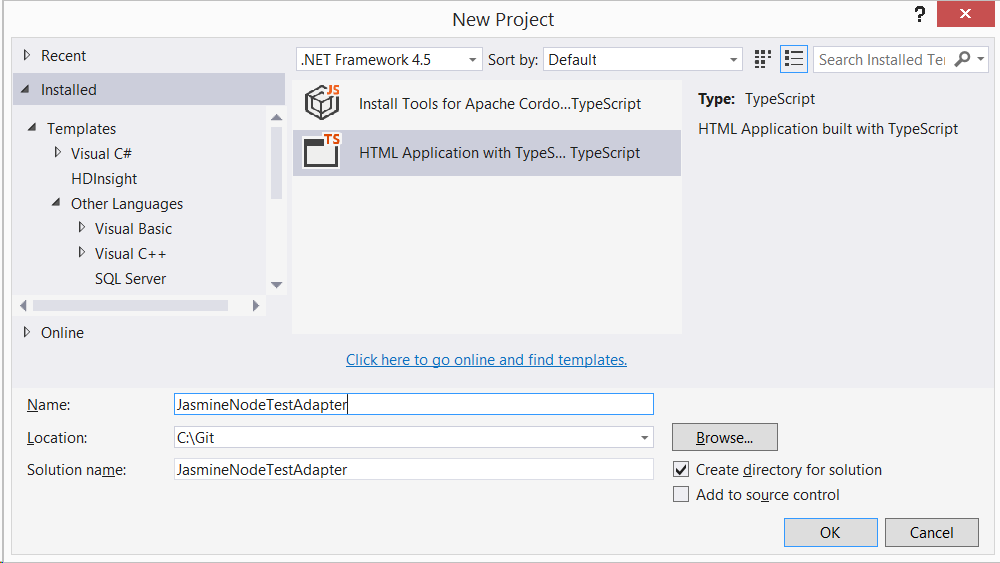
Once this is done, the solution explorer should look something like this:
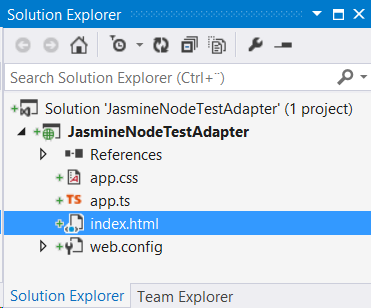
Delete all the files, that are added by default:
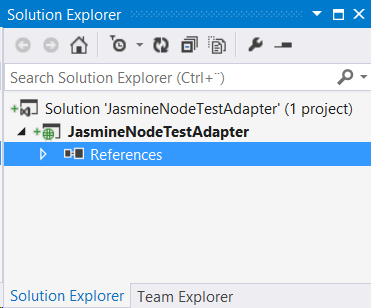
In the properties for the project make sure typescript files are compiled as "CommonJS" modules:
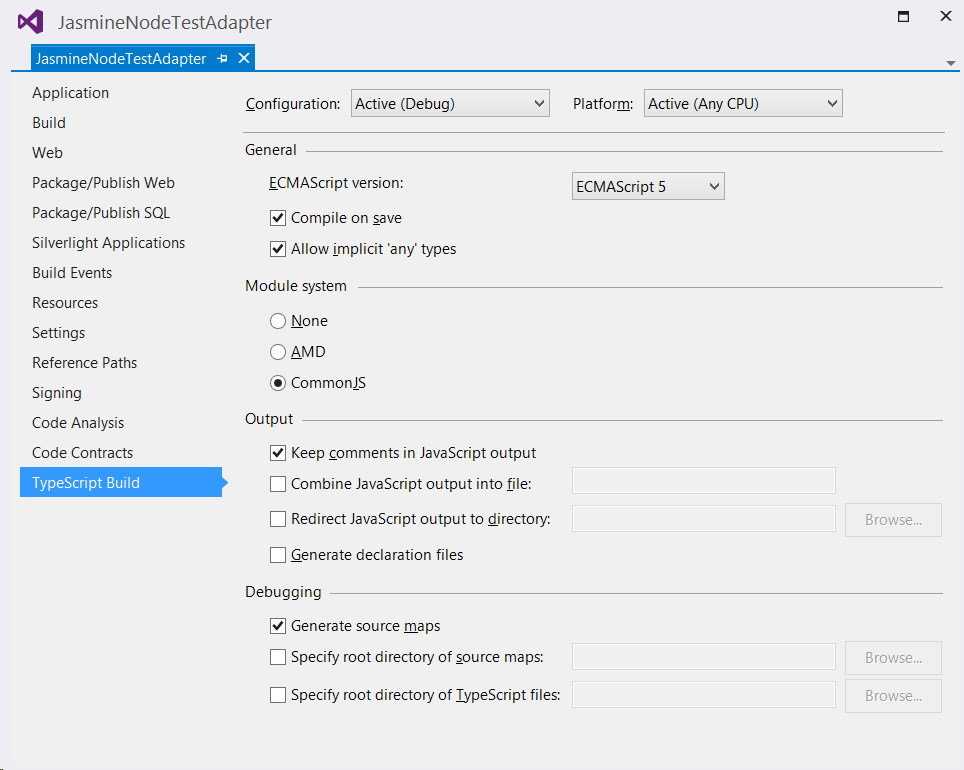
Now the JsTestAdapter NuGet package is installed:

Once JsTestAdapter is installed the solution should look something like this:
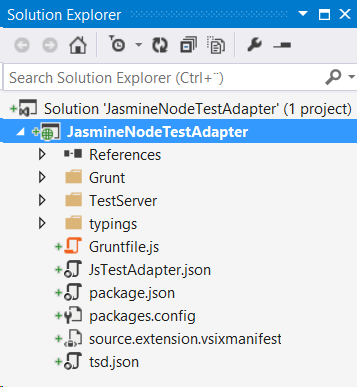
The Task Runner Explorer looks like (it might be necessary to run nmp install from a command prompt, and to click the Refresh button in the Task Runner Explorer):
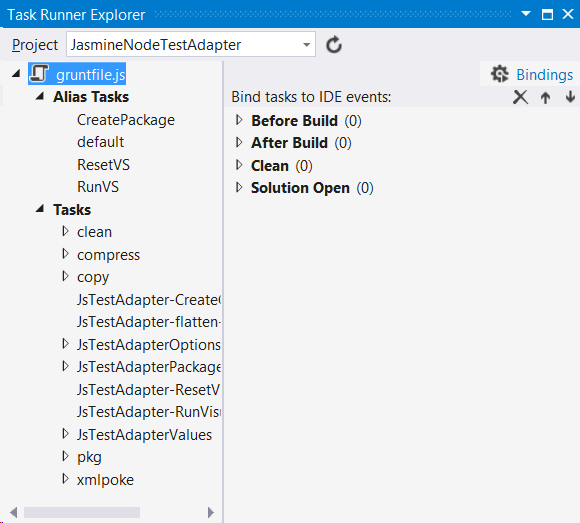
I can now build the solution, and double click the CreatePackage grunt task in the Task Runner Explorer. If I show all files in the Solution Explorer, I should see that a package JasmineNodeJsTestAdapter.vsix has been created:
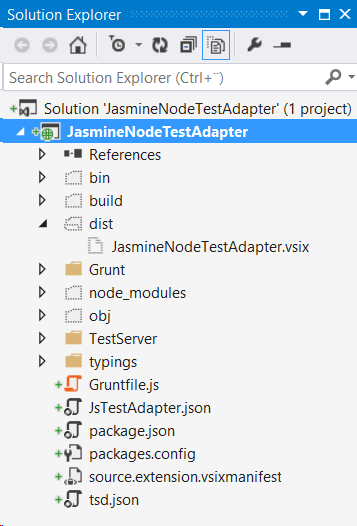
To automate the creation of the package we bind the CreatePackage task to the After Build event in the Task Runner Explorer:
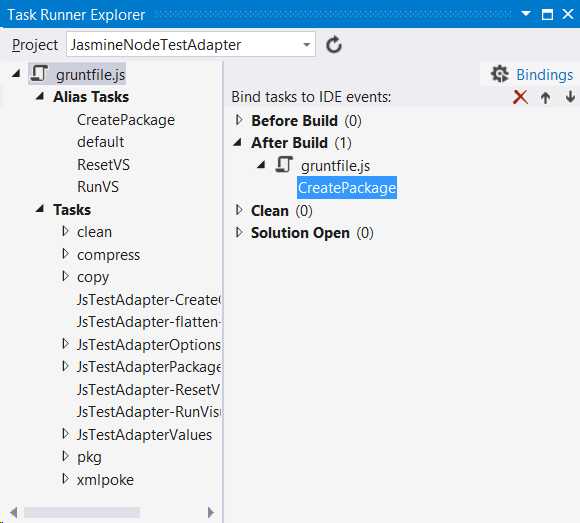
From now on the package JasmineNodeJsTestAdapter.vsix will be created after every build.
Solution level files
To keep track of solution level files, I create a new solution folder Solution Files, and add the files in the solution directory:

Notice, that I have created a LICENSE file with the MIT License.
package.json
A package.json file has been generated, and looks like:
{
"name": "JasmineNodeTestAdapter",
"version": "0.0.1",
"private": true,
"devDependencies": {
"extend": "^2.0.0",
"flatten-packages": "^0.1.4",
"grunt": "^0.4.5",
"grunt-contrib-clean": "^0.6.0",
"grunt-contrib-compress": "^0.13.0",
"grunt-contrib-copy": "^0.8.0",
"grunt-exec": "^0.4.6",
"grunt-nuget": "^0.1.4",
"grunt-xmlpoke": "^0.8.0",
"regedit": "^2.1.0",
"semver": "^4.3.1",
"string-template": "^0.2.0",
"xmlbuilder": "^2.6.2",
"zpad": "^0.5.0"
},
"dependencies": {
"error-stack-parser": "^1.1.2",
"iconv-lite": "^0.4.7",
"q": "^1.2.0",
"source-map": "^0.4.0",
"source-map-resolve": "^0.3.1",
"stackframe": "^0.2.2",
"yargs": "^3.5.4"
}
}
The version of the package JasmineNodeJsTestAdapter.vsix is generated from the version property in package.json when the CreatePackage task is run, so this is where the current version of the package is maintained.
source.extension.vsixmanifest
A source.extension.vsixmanifest file has been generated, and looks like:
<?xml version="1.0" encoding="utf-8"?>
<PackageManifest Version="2.0.0" xmlns="http://schemas.microsoft.com/developer/vsx-schema/2011">
<Metadata>
<Identity Id="JasmineNodeTestAdapter.25d980f5-bb63-4cae-8dd4-b165922e9c98" Version="x.x.x" Language="en-US" Publisher="" />
<DisplayName>JasmineNodeTestAdapter</DisplayName>
<Description xml:space="preserve">JasmineNodeTestAdapter</Description>
<MoreInfo></MoreInfo>
<License></License>
</Metadata>
<Installation>
<InstallationTarget Version="[12.0,14.0]" Id="Microsoft.VisualStudio.Pro" />
<InstallationTarget Version="[12.0,14.0]" Id="Microsoft.VisualStudio.Premium" />
<InstallationTarget Version="[12.0,14.0]" Id="Microsoft.VisualStudio.Ultimate" />
</Installation>
<Dependencies>
<Dependency Id="Microsoft.Framework.NDP" DisplayName="Microsoft .NET Framework" Version="[4.5,)" />
</Dependencies>
<Assets>
<Asset Type="Microsoft.VisualStudio.MefComponent" Path="JasmineNodeTestAdapter.dll" />
<Asset Type="UnitTestExtension" Path="JasmineNodeTestAdapter.dll" />
</Assets>
</PackageManifest>
I want to fill out Publisher attribute of the Identity element:
<Identity Id="JasmineNodeTestAdapter.25d980f5-bb63-4cae-8dd4-b165922e9c98" Version="x.x.x" Language="en-US" Publisher="Morten Houston Ludvigsen" />
Also, I want to fill out the MoreInfo and License elements:
<MoreInfo>https://github.com/MortenHoustonLudvigsen/JasmineNodeTestAdapter</MoreInfo>
<License>LICENSE</License>
Notice, that I don't change the Version attribute of the Identity element. This is handled by the CreatePackage grunt task.
Gruntfile.js
I will be creating a node program to run Jasmine tests in a new directory: JasmineTestServer, and I will be creating a solution with test projects under a new directory TestProjects in the main solution directory. Therefore I change Gruntfile.js accordingly:
var jsTestAdapter = require('./Grunt/Index');
module.exports = function (grunt) {
grunt.initConfig({
});
jsTestAdapter.config(grunt, {
name: 'JasmineNodeTestAdapter',
lib: 'JasmineTestServer',
bin: 'bin',
rootSuffix: 'JasmineNodeTestAdapter',
testProject: '../TestProjects/TestProjects.sln'
});
grunt.registerTask('CreatePackage', [
'clean:JsTestAdapter',
'copy:JsTestAdapter',
'JsTestAdapter-flatten-packages',
'xmlpoke:JsTestAdapter-vsix',
'JsTestAdapter-CreateContentTypes',
'compress:JsTestAdapter'
]);
grunt.registerTask('ResetVS', [
'JsTestAdapter-ResetVisualStudio'
]);
grunt.registerTask('RunVS', [
'JsTestAdapter-ResetVisualStudio',
'JsTestAdapter-RunVisualStudio'
]);
grunt.registerTask('default', ['CreatePackage']);
}
Test Projects
Before I start implementing the test adapter, I want to make a simple test project.
In the main solution directory I create a new empty solution named "TestProjects":
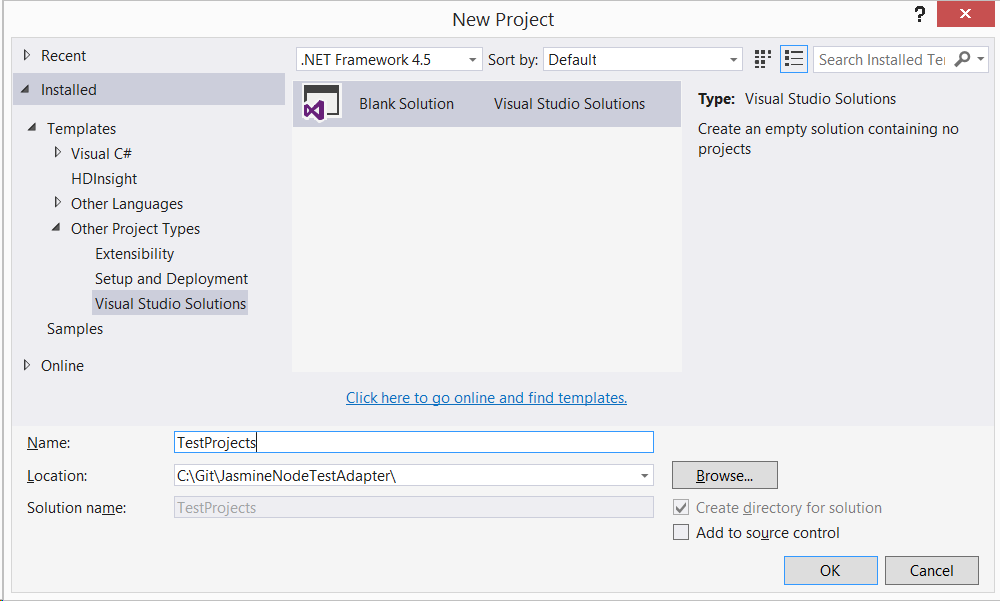
I like working in TypeScript, so I will use it to implement tests. This will also demonstrate that source mapping works.
In the test solution I create a new "HTML Application with TypeScript" named "TypescriptTests" (as before, I delete all the files, that are added by default):
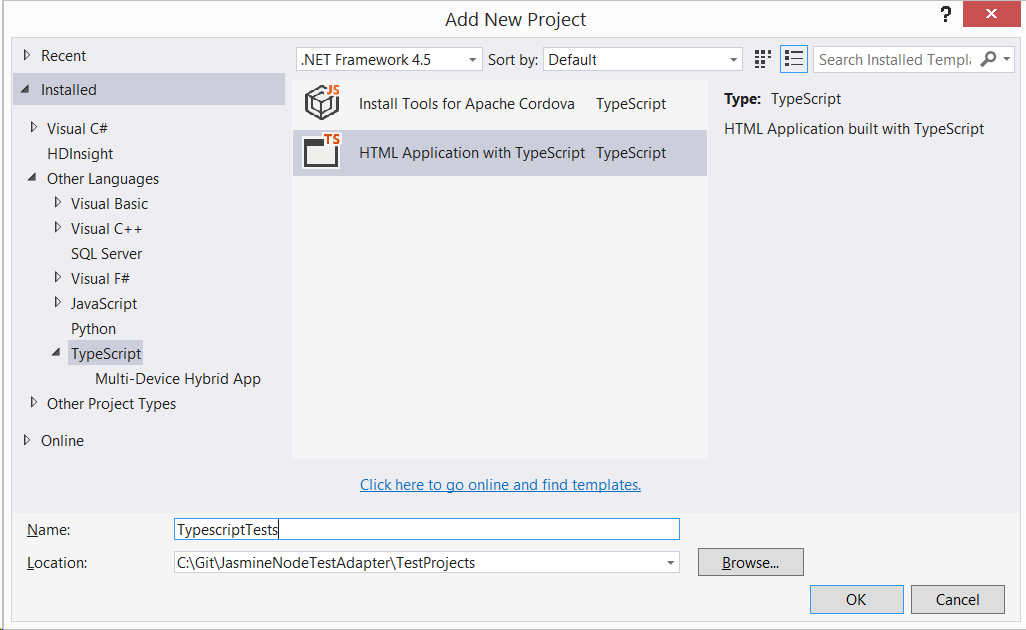
I also configure TypeScript to use CommonJS modules:
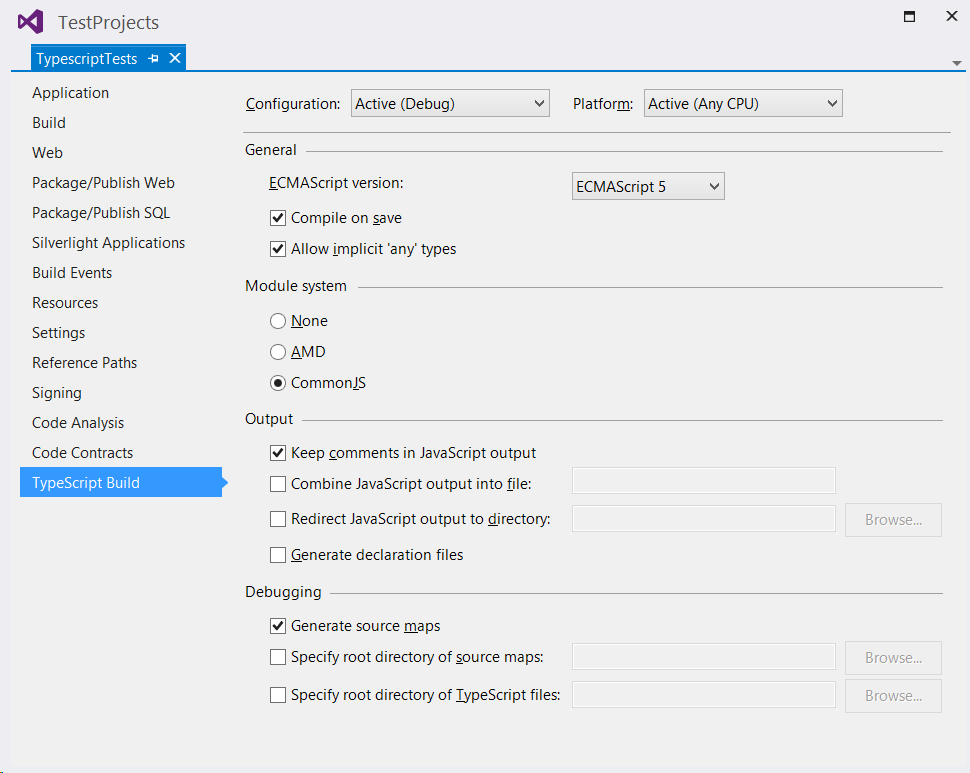
I add a package.json file to track node modules (I make sure that it is saved as UTF-8 without signature - otherwise npm will not be able to update it):
{
"name": "TypescriptTests",
"version": "0.0.0",
"private": true
}
I need to install Jasmine, so I jump to a command prompt and run:
cd C:\Git\JasmineNodeTestAdapter\TestProjects\TypescriptTests
npm install jasmine --save-dev
I also need the TypeScript definitions for Jasmine:
cd C:\Git\JasmineNodeTestAdapter\TestProjects\TypescriptTests
tsd query jasmine --action install --save
I include the generated files in the test project (not node_modules).
To have something to test, I add a TypeScript file Adder.ts in new folder src:
export function add(a: number, b: number): number {
return a + b;
}
I want a handful of Jasmine tests, so I create TypeScript file AdderSpec.ts in new folder specs:
import Adder = require('../src/Adder');
describe('Adder',() => {
describe('add',() => {
// This spec should succeed:
describe('(3, 3)',() => {
it('should return 6',() => expect(Adder.add(3, 3)).toEqual(6));
});
// This spec should succeed:
describe('(3, 6)',() => {
it('should return 9',() => expect(Adder.add(3, 6)).toEqual(9));
});
// This spec should fail:
describe('(3, 7)',() => {
it('should return 9',() => expect(Adder.add(3, 7)).toEqual(9));
});
});
});
My test project now looks like:
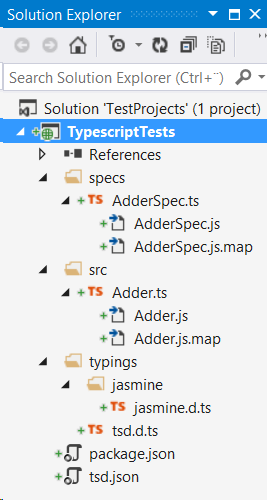
Notice, that I have used File Nesting to nest the .js and .js.map files produced by the TypeScript compiler under the corresponding .ts file.
Testing the test adapter
I can now start an experimental instance of Visual Studio with the the latest build of the test adapter installed by double clicking the RunVS task in the Task Runner Explorer. The first time I do this, I am asked for my credentials in Visual Studio.
Visual Studio opens with the test project loaded (as set up in Gruntfile.js), and I can open the Test Explorer to see test results. Of course, until I have implemented the adapter, nothing is shown in the Test Explorer.
For this to work Microsoft Visual Studio 2013 SDK needs to be installed first.
It is also possible to start the experimental instance of Visual Studio from the debugger. This can be set up in the project properties:

However, for this to work properly, the project needs to be built, and then the ResetVS task in the Task Runner Explorer needs to be run. All this before starting a debug session.
The reason for this is that the debug session starts before the CreatePackage task is finished running. Otherwise the ResetVS task could be a part of the CreatePackage task. As far as I can tell this has been fixed in Visual Studio 2015 CTP, where the debugger waits for the Task Runner Explorer to finish before starting. In this case one could create a task AfterBuild in Gruntfile.js, and bind that to the After Build event in the Task Runner Explorer, instead of CreatePackage:
grunt.registerTask('AfterBuild', [
'CreatePackage',
'ResetVS'
]);
JSON schema for the configuration file
To make it easier to configure the adapter by providing intellisense in Visual Studio, I create a JSON schema called JasmineNodeTestAdapter.schema.json in the solution directory, and add it to Solution Files:
{
"$schema": "http://json-schema.org/draft-04/schema#",
"title": "JSON schema for JasmineNodeTestAdapter configuration files (JasmineNodeTestAdapter.json)",
"type": "object",
"additionalProperties": false,
"properties": {
"$schema": {
"type": "string",
"format": "uri"
},
"Name": {
"description": "The name of the test container.",
"type": "string"
},
"BasePath": {
"description": "The base path to use to resolve file paths. Defaults to the directory in which JasmineNodeTestAdapter.json resides.",
"type": "string"
},
"Helpers": {
"description": "Non-source, non-spec helper files. Loaded before any specs. Wildcards can be used - see [glob](https://www.npmjs.com/package/glob).",
"type": "array",
"items": { "type": "string" }
},
"Specs": {
"description": "Files containing Jasmine specs. Wildcards can be used - see [glob](https://www.npmjs.com/package/glob).",
"type": "array",
"items": { "type": "string" }
},
"Watch": {
"description": "A test run is triggered if any file specified in `Helpers` or `Specs` change. Add any files in `Watch` that should also trigger a test run when they change. These will typically be the source files. Wildcards can be used - see [glob](https://www.npmjs.com/package/glob).",
"type": "array",
"items": { "type": "string" }
},
"BatchInterval": {
"description": "When the test adapter is watching files for changes, it will wait `BatchInterval` ms before running tests. Default value is 250.",
"type": "number"
},
"Traits": {
"description": "Traits to attach to each test.",
"type": "array",
"items": {
"anyOf": [
{ "type": "string" },
{
"type": "object",
"properties": {
"Name": { "type": "string" },
"Value": { "type": "string" }
},
"required": [ "Name" ]
}
]
}
},
"Extensions": {
"description": "Path to a node.js module implementing extensions.",
"type": "string"
},
"Disabled": {
"description": "Set to true, if the test adapter should be disabled for this configuration file.",
"type": "boolean"
},
"LogToFile": {
"description": "Set to true, if you want the adapter to write log statements to a log file (named JasmineNodeTestAdapter.log).",
"type": "boolean"
},
"LogDirectory": {
"description": "Where the log file should be saved (if LogToFile is true). If this property is not specified the directory in which JasmineNodeTestAdapter.json resides is used.",
"type": "string"
}
}
}
The Jasmine runner
Now I am ready to implement the test adapter. I will start with the Jasmine runner. As mentioned earlier, this will be a node program that runs a set of Jasmine tests once and reports the results to the test server.
The source code for the Jasmine runner and the test server will reside in new folder JasmineTestServer in the project.
JasmineTestServer/JasmineLogger.ts
JsTestAdapter defines an interface Logger (in TestServer/Logger.ts):
interface Logger {
info(message: string, ...args: any[]): void;
warn(message: string, ...args: any[]): void;
error(message: string, ...args: any[]): void;
debug(message: string, ...args: any[]): void;
}
Objects implementing this interface will be needed in both the Jasmine runner and the test server.
A log4js logger implements the Logger interface, so I will install it from a command prompt:
cd C:\Git\JasmineNodeTestAdapter\JasmineNodeTestAdapter
npm install log4js --save
I also want the TypeScript definitions for log4js (which depend on definitions for express):
cd C:\Git\JasmineNodeTestAdapter\JasmineNodeTestAdapter
tsd query log4js --action install --save
tsd query express --action install --save
This adds files to the typings folder, which I include in the project.
Now I can implement a function, that returns a Logger object given a category. I create JasmineLogger.ts (in the JasmineTestServer folder):
import log4js = require('log4js');
import Logger = require('../TestServer/Logger');
log4js.configure({
appenders: [
{
type: 'console',
layout: {
type: 'pattern',
pattern: '%p [%c]: %m'
}
}
]
});
function JasmineLogger(category: string): Logger {
return log4js.getLogger(category);
}
export = JasmineLogger;
JasmineTestServer/Settings.ts
I will need to read settings from JasmineNodeTestAdapter.json configuration files. Therefore i make an interface in Settings.ts:
import Specs = require('../TestServer/Specs');
interface Settings {
BasePath: string;
Helpers: string[];
Specs: string[];
Watch: string[];
BatchInterval: number;
Traits: (string|Specs.Trait)[];
Extensions?: string;
}
export = Settings;
Note that I import ../TestServer/Specs, which contains a number of central interfaces defined in JsTestAdapter. Note also that I only define the properties I expect to need in the Jasmine runner and the test server.
JasmineTestServer/Constants.ts
I want default setting values. I implement this in Constants.ts:
import Settings = require('./Settings');
export var defaultSettings = <Settings>{
BasePath: undefined,
Helpers: [],
Specs: [],
Watch: [],
BatchInterval: 250,
Traits: []
};
JasmineTestServer/Utils.ts
It is not enough to define an interface for settings. I also need to be able to read them from a file. I implement this in Utils.ts:
import path = require('path');
import extend = require('extend');
import Settings = require('./Settings');
import Constants = require('./Constants');
import TextFile = require('../TestServer/TextFile');
export function loadSettings(settingsFile: string): Settings {
var settings = <Settings>extend(Constants.defaultSettings, TextFile.readJson(settingsFile));
// Use the directory of the settings file if settings.BasePath is not specified
settings.BasePath = settings.BasePath || path.dirname(settingsFile);
// Resolve paths to full paths
settings.Helpers = settings.Helpers.map(pattern => path.resolve(settings.BasePath, pattern));
settings.Specs = settings.Specs.map(pattern => path.resolve(settings.BasePath, pattern));
settings.Watch = settings.Watch.map(pattern => path.resolve(settings.BasePath, pattern));
// Watch helpers and specs as well
settings.Watch = settings.Watch.concat(settings.Helpers).concat(settings.Specs);
return settings;
}
Note that I read the settings file using the TextFile module from JsTestAdapter. This makes it possible to read files encoded in one of the following encodings:
- UTF-8
- UTF-8 with BOM / Signature
- UTF-16 Big-Endian with BOM / Signature
- UTF-16 Little-Endian with BOM / Signature
JasmineTestServer/JasmineRunner.ts
Next, I will implement the Jasmine runner itself.
First, I need to install glob so I can interpret the paths supplied in the settings file:
cd C:\Git\JasmineNodeTestAdapter\JasmineNodeTestAdapter
npm install glob --save
I also want the TypeScript definitions for glob (which depends on the definitions for minimatch):
cd C:\Git\JasmineNodeTestAdapter\JasmineNodeTestAdapter
tsd query glob --action install --save
tsd query minimatch --action install --save
This adds files to the typings folder, which I include in the project.
Now I can implement JasmineRunnet.ts (I will add a reporter to this later):
import path = require('path');
import glob = require('glob');
import JasmineLogger = require('./JasmineLogger');
import Utils = require('./Utils');
var Jasmine = require('jasmine');
var argv = require('yargs')
.usage('Usage: $0 --settings [settings file]')
.demand(['settings'])
.argv;
var logger = JasmineLogger('Jasmine Runner');
// Load settings
var settings = Utils.loadSettings(argv.settings);
// Create an Jasmine instance
var jasmine = new Jasmine({ projectBaseDir: settings.BasePath });
// Add helpers to jasmine
settings.Helpers.forEach(pattern => {
glob.sync(pattern, { nodir: true }).forEach(f => {
jasmine.addSpecFile(f);
});
});
// Add specs to jasmine
settings.Specs.forEach(pattern => {
glob.sync(pattern, { nodir: true }).forEach(f => {
jasmine.addSpecFile(f);
});
});
// Run the jasmine specs
jasmine.execute();
I should now be able to run the specs in my test project. To do this I open the TestProjects.sln solution.
To the TypescriptTests project, I add a JasmineNodeTestAdapter.json file:
{
"$schema": "http://MortenHoustonLudvigsen.github.io/JasmineNodeTestAdapter/JasmineNodeTestAdapter.schema.json",
"Specs": [ "specs/**/*[Ss]pec.js" ],
"Watch": [ "src/**/*.js" ]
}
I also add a batch script Start.cmd:
@ECHO OFF
setlocal
cd %~dp0
set CurrentDir=%CD%
cd %~dp0..\..
set SolutionDir=%CD%
set TestProjectsDir=%SolutionDir%\TestProjects
set JasmineRunner=%SolutionDir%\JasmineNodeTestAdapter\JasmineTestServer\JasmineRunner.js
:: Set NODE_PATH to simulate starting node from %CurrentDir%
set NODE_PATH=%CurrentDir%\node_modules
set NODE_PATH=%NODE_PATH%;%TestProjectsDir%\node_modules
set NODE_PATH=%NODE_PATH%;%SolutionDir%\node_modules;%AppData%\Roaming\npm\node_modules
:: Add the default path to the global node_modules:
set NODE_PATH=%NODE_PATH%;%AppData%\Roaming\npm\node_modules
:: Run jasmine specs using JasmineRunner.js
node "%JasmineRunner%" --settings "%CurrentDir%\JasmineNodeTestAdapter.json"
Now I can open a command prompt, and run Start.cmd with the following result:
Started
..F
Failures:
1) Adder add (3, 7) should return 9
Message:
Expected 10 to equal 9.
Stack:
Error: Expected 10 to equal 9.
at Object.<anonymous> (C:\Git\JasmineNodeTestAdapter\TestProjects\TypescriptTests\specs\AdderSpec.js:14:80)
3 specs, 1 failure
Finished in 0.009 seconds
JasmineTestServer/JasmineInstumentation.ts
For the test adapter to be able to link to spec source code, I need to wrap the Jasmine functions [xf]describe and [xf]it to add a property source to the result. This is done in JasmineInstumentation.ts:
import Specs = require('../TestServer/Specs');
interface WrappedFunction extends Function {
__test_adapter_source_wrapped?: boolean;
}
export function wrapFunctions(jasmineEnv: any): void {
['describe', 'xdescribe', 'fdescribe', 'it', 'xit', 'fit'].forEach(functionName => {
var oldFunction: WrappedFunction = jasmineEnv[functionName];
if (typeof oldFunction !== 'function' || oldFunction.__test_adapter_source_wrapped) {
return;
}
var wrapped: { [name: string]: WrappedFunction } = {};
wrapped[functionName] = function (description: string, done: Function): void {
var item = oldFunction.apply(this, Array.prototype.slice.call(arguments));
try {
// throw error to get a stack trace
throw new Error();
} catch (error) {
// record the stack trace
item.result.source = <Specs.StackInfo>{
// To find the stack frame that corresponds to the spec,
// skip the first 2 stack frames, then skip any stack frames
// with function names matching "^(jasmineInterface|Env)\."
skip: 2,
skipFunctions: "^(jasmineInterface|Env)\.",
stack: error.stack
};
}
return item;
};
wrapped[functionName].__test_adapter_source_wrapped = true;
jasmineEnv[functionName] = wrapped[functionName];
});
}
Then I add this to JasmineRunner.ts:
...
import JasmineLogger = require('./JasmineLogger');
import JasmineInstumentation = require('./JasmineInstumentation');
import Utils = require('./Utils');
...
// Create an Jasmine instance
var jasmine = new Jasmine({ projectBaseDir: settings.BasePath });
// Wrap jasmine functions to get source information
JasmineInstumentation.wrapFunctions(jasmine.env);
...
JasmineTestServer/Timer.ts
I want elapsed time for each spec to be measured in high resolution. So I implement a simple module Timer.ts:
var startTime = process.hrtime();
// A high resolution timer
export function now(): number {
var time = process.hrtime(startTime);
return time[0] * 1e3 + time[1] / 1e6;
}
JasmineTestServer/JasmineReporter.ts
I can not use the default reporter in Jasmine. I need to implement one, that reports results to a test server (not yet implemented).
import util = require('util');
import Specs = require('../TestServer/Specs');
import TestContext = require('../TestServer/TestContext');
import TestReporter = require('../TestServer/TestReporter');
import Logger = require('../TestServer/Logger');
import Timer = require('./Timer');
import JasmineLogger = require('./JasmineLogger');
interface SuiteInfo {
totalSpecsDefined?: number;
}
interface Result {
root?: boolean;
id?: string;
isSuite?: boolean;
suite?: SuiteResult;
source?: any;
fullName?: string;
description?: string;
status?: string;
startTime?: number;
endTime?: number;
}
interface SuiteResult extends Result {
}
interface SpecResult extends Result {
failedExpectations?: any[];
}
function isValidStackFrame(entry: string): boolean {
return (entry ? true : false) &&
// discard entries related to jasmine:
!/[\/\\]jasmine-core[\/\\]/.test(entry) &&
// discard entries related to the Jasmine Node test adapter:
!/[\/\\]JasmineTestServer[\/\\]/.test(entry);
}
function pruneStack(stack: string): string[] {
return stack
.split(/\r\n|\n/)
.filter(frame => isValidStackFrame(frame));
}
function getFailure(failure: any): Specs.Failure {
var expectation = <Specs.Failure>{
message: failure.message,
passed: failure.passed,
stack: {}
};
var messageLines = failure.message.split(/\r\n|\n/);
var messageLineCount = messageLines.length;
if (failure.stack) {
var stack = pruneStack(failure.stack).slice(messageLines.length);
stack.unshift(messageLines[0] || '');
expectation.stack = { stack: stack.join('\n') };
} else if (failure.stacktrace) {
var stack = pruneStack(failure.stacktrace).slice(messageLines.length);
stack.unshift(messageLines[0] || '');
expectation.stack = { stacktrace: stack.join('\n') };
}
return expectation;
}
function skipLines(str: string, count: number): string {
return str.split(/\r\n|\n/).slice(count).join('\n');
}
function formatFailure(failure: Specs.Failure): string {
var result = failure.message;
if (failure.stack && failure.stack.stack) {
result += '\n' + skipLines(failure.stack.stack, 1);
}
if (failure.stack && failure.stack.stacktrace) {
result += '\n' + skipLines(failure.stack.stacktrace, 1);
}
return result;
}
function isTopLevelSuite(suite) {
return suite.description === 'Jasmine_TopLevel_Suite';
}
class JasmineReporter {
constructor(public server: Specs.Server, public basePath: string) {
}
private logger = JasmineLogger('Jasmine Reporter');
private testReporter: TestReporter;
private context: Specs.Context;
private currentSuite: SuiteResult;
public isRunning = false;
private getSuiteList(result: Result): string[] {
if (result.root || result.suite.root) {
return [];
}
var suites = this.getSuiteList(result.suite);
suites.push(result.suite.description);
return suites;
}
private originalConsoleFunctions = {
log: console.log,
debug: console.debug,
info: console.info,
warn: console.warn,
error: console.error
};
private replaceConsole(): void {
['log', 'debug', 'info', 'warn', 'error'].forEach(item => {
console[item] = () => this.testReporter.onOutput(this.context, util.format.apply(util, arguments));
});
}
private restoreConsole(): void {
['log', 'debug', 'info', 'warn', 'error'].forEach(item => {
console[item] = this.originalConsoleFunctions[item];
});
}
jasmineStarted(suiteInfo: SuiteInfo) {
this.isRunning = true;
// In this test adapter, there is only one context: Node.js
// In the Karma Test Adapter there is a context per browser
this.context = {
name: 'Node.js'
};
this.currentSuite = {
root: true,
isSuite: true
};
this.testReporter = new TestReporter(this.server, this.basePath, this.logger, fileName => fileName);
this.testReporter.onTestRunStart();
this.testReporter.onContextStart(this.context);
this.replaceConsole();
}
jasmineDone() {
this.restoreConsole();
this.testReporter.onContextDone(this.context);
this.testReporter.onTestRunComplete();
this.isRunning = false;
}
jasmineFailed(error: any): void {
if (!this.isRunning) {
this.jasmineStarted({ totalSpecsDefined: undefined });
}
this.testReporter.onError(this.context, error);
this.jasmineDone();
}
suiteStarted(suite: SuiteResult) {
if (!isTopLevelSuite(suite)) {
suite.isSuite = true;
suite.suite = this.currentSuite;
suite.startTime = Timer.now();
this.currentSuite = suite;
this.testReporter.onSuiteStart(this.context);
}
}
suiteDone(suite: SuiteResult) {
if (!isTopLevelSuite(suite)) {
suite.endTime = Timer.now();
// In the case of xdescribe, only "suiteDone" is fired.
// We need to skip that.
if (this.currentSuite === suite) {
this.currentSuite = suite.suite;
}
this.testReporter.onSuiteDone(this.context);
}
}
specStarted(spec: SpecResult) {
spec.suite = this.currentSuite;
spec.startTime = Timer.now();
this.testReporter.onSpecStart(this.context, {
description: spec.description,
id: spec.id
});
}
specDone(spec: SpecResult) {
spec.endTime = Timer.now();
var failures = spec.failedExpectations ? spec.failedExpectations.map(exp => getFailure(exp)) : [];
this.testReporter.onSpecDone(this.context, {
description: spec.description,
id: spec.id,
log: failures.map(failure => formatFailure(failure)),
skipped: spec.status === 'disabled' || spec.status === 'pending',
success: spec.failedExpectations.length === 0,
suite: this.getSuiteList(spec),
time: spec.endTime - spec.startTime,
startTime: spec.startTime,
endTime: spec.endTime,
source: spec.source,
failures: failures
});
}
}
export = JasmineReporter;
Now I need to get JasmineRunner.ts to use the reporter:
import path = require('path');
import glob = require('glob');
import TestNetServer = require('../TestServer/TestNetServer');
import JasmineLogger = require('./JasmineLogger');
import JasmineInstumentation = require('./JasmineInstumentation');
import JasmineReporter = require('./JasmineReporter');
import Utils = require('./Utils');
var Jasmine = require('jasmine');
var logger = JasmineLogger('Jasmine Runner');
var argv = require('yargs')
.usage('Usage: node JasmineRunner.js [options]')
.demand(['settings', 'port'])
.describe('name', 'The name of the test container')
.describe('port', 'The test server port')
.describe('settings', 'The settings file (JasmineNodeTestAdapter.json)')
.argv;
var name = argv.name || '';
var port = argv.port;
// Load settings
var settings = Utils.loadSettings(argv.settings);
// Create a TestNetServer, that can report test results to the test server
var server = new TestNetServer(name, port);
// Create an Jasmine instance
var jasmine = new Jasmine({ projectBaseDir: settings.BasePath });
// Wrap jasmine functions to get source information
JasmineInstumentation.wrapFunctions(jasmine.env);
// Add helpers to jasmine
settings.Helpers.forEach(pattern => {
glob.sync(pattern, { nodir: true }).forEach(f => {
jasmine.addSpecFile(f);
});
});
// Add specs to jasmine
settings.Specs.forEach(pattern => {
glob.sync(pattern, { nodir: true }).forEach(f => {
jasmine.addSpecFile(f);
});
});
var reporter = new JasmineReporter(server, settings.BasePath);
jasmine.addReporter(reporter);
try {
// Run the jasmine specs
jasmine.execute();
} catch (e) {
// If there is an unhandled error report it as a failed test
reporter.jasmineFailed(e);
}
Note that running Start.cmd in the test project will now fail, because there is no test server.
The test server
Now that the Jasmine runner has been implemented, I will implement the test server. As mentioned earlier, this will be a node program that runs in the background running the Jasmine runner when needed and reports the results to the test adapter.
I will want the test server to be able to react to file changes, so I will install gaze:
cd C:\Git\JasmineNodeTestAdapter\JasmineNodeTestAdapter
npm install gaze --save
JasmineTestServer/Server.ts
I need to implement a class that extends the TestServer class from JsTestAdapter:
import path = require('path');
import TestServer = require('../TestServer/TestServer');
import JsonConnection = require('../TestServer/JsonConnection');
import Specs = require('../TestServer/Specs');
import JasmineLogger = require('./JasmineLogger');
import Settings = require('./Settings');
class Server extends TestServer {
constructor(name: string, settings: Settings) {
super(name);
if (settings.Traits) {
var traits = settings.Traits.map(trait => typeof trait === 'string' ? { name: trait } : trait);
this.loadExtensions({ getTraits: (spec, server) => traits });
}
if (settings.Extensions) {
try {
this.loadExtensions(path.resolve(settings.Extensions));
} catch (e) {
this.logger.error('Failed to load extensions from ' + settings.Extensions + ': ' + e.message);
}
}
this.once('listening',() => this.logger.info('Started - port:', this.address.port));
this.start();
}
logger = JasmineLogger('Jasmine Server');
onError(error: any, connection: JsonConnection) {
this.logger.error(error);
}
testRunStarted(): void {
this.logger.info('Test run start');
super.testRunStarted();
}
testRunCompleted(specs: Specs.Spec[]): void {
this.logger.info('Test run complete');
super.testRunCompleted(specs);
}
}
export = Server;
JasmineTestServer/Runner.ts
The test server needs to be able to run the Jasmine runner as a child process. A test run should be scheduled and only run when no further test runs have been scheduled for an amount of time (batchInterval). I implement this in Runner.ts:
import path = require('path');
import child_process = require('child_process');
import events = require('events');
import Server = require('./Server');
function quoteArg(argument: string): string {
argument = argument || '';
if (!argument || /\s|"/.test(argument)) {
argument = argument.replace(/(\\+)"/g, '$1$1"');
argument = argument.replace(/(\\+)$/, '$1$1');
argument = argument.replace(/"/g, '\\"');
argument = '"' + argument + '"';
}
return argument;
}
class Runner extends events.EventEmitter {
constructor(private name: string, private settingsFile: string, private batchInterval: number, private server: Server) {
super();
}
private isRunning = false;
private scheduleTimeout: NodeJS.Timer;
schedule() {
if (!this.isRunning) {
clearTimeout(this.scheduleTimeout);
this.scheduleTimeout = setTimeout(() => this.run(), this.batchInterval);
} else {
clearTimeout(this.scheduleTimeout);
this.scheduleTimeout = setTimeout(() => this.schedule(), this.batchInterval);
}
}
stop() {
clearTimeout(this.scheduleTimeout);
}
run() {
if (this.isRunning) {
this.schedule();
return;
}
this.isRunning = true;
clearTimeout(this.scheduleTimeout);
var options = { stdio: 'inherit' };
var args = [
path.join(__dirname, 'JasmineRunner.js'),
'--name', this.name,
'--port', this.server.address.port.toString(),
'--settings', this.settingsFile
].map(quoteArg);
child_process.spawn(process.execPath, args, options).on('exit', code => {
this.isRunning = false;
this.emit('exit', code);
});
}
}
export = Runner;
JasmineTestServer/Start.ts
I can now implement the module, that starts the test server:
import Server = require('./Server');
import Runner = require('./Runner');
import Utils = require('./Utils');
var argv = require('yargs')
.usage('Usage: node Start.js [options]')
.demand(['settings'])
.describe('name', 'The name of the test container')
.describe('settings', 'The settings file (JasmineNodeTestAdapter.json)')
.describe('singleRun', 'Run tests only once')
.argv;
var name = argv.name || '';
var settings = Utils.loadSettings(argv.settings);
var server = new Server(name, settings);
var runner = new Runner(name, argv.settings, settings.BatchInterval, server);
if (argv.singleRun) {
runner.on('exit', code => process.exit(code));
} else {
var gaze = require('gaze');
gaze(settings.Watch, function (err, watcher) {
this.on('all',(event, filepath) => runner.schedule());
});
}
server.once('listening',() => runner.run());
server.start();
In the test project, I change Start.cmd to run Start.js instead of JasmineRunner.js, and make sure it only runs once:
@ECHO OFF
setlocal
cd %~dp0
set CurrentDir=%CD%
cd %~dp0..\..
set SolutionDir=%CD%
set TestProjectsDir=%SolutionDir%\TestProjects
set TestServer=%SolutionDir%\JasmineNodeTestAdapter\JasmineTestServer\Start.js
:: Set NODE_PATH to simulate starting node from %CurrentDir%
set NODE_PATH=%CurrentDir%\node_modules
set NODE_PATH=%NODE_PATH%;%TestProjectsDir%\node_modules
set NODE_PATH=%NODE_PATH%;%SolutionDir%\node_modules;%AppData%\Roaming\npm\node_modules
:: Add the default path to the global node_modules:
set NODE_PATH=%NODE_PATH%;%AppData%\Roaming\npm\node_modules
:: Run jasmine specs using Start.js
node "%TestServer%" --settings "%CurrentDir%\JasmineNodeTestAdapter.json" --singleRun
When i run Start.cmd, I get the following result:
INFO [Jasmine Server]: Started - port: 55755
INFO [Jasmine Server]: Test run start
INFO [Jasmine Server]: Test run complete
There is not much output here, but that is expected. The server will report results to the test adapter if and when it is connected.
The test adapter
It's time to implement the Test Explorer adapter, implemented in C#. As mentioned earlier, it will start a test server for each set of tests and respond to events from the test servers by updating the Test Explorer.
Globals.cs
First, I need to specify some global values, in Globals.cs, which i place in the root folder of the project:
using System;
using System.IO;
using System.Reflection;
namespace JasmineNodeTestAdapter
{
public class Globals
{
/// <summary>
/// The Uri string used to identify the JasmineNodeTestAdapter executor.
/// </summary>
public const string ExecutorUriString = "executor://JasmineNodeTestAdapter";
/// <summary>
/// The Uri used to identify the JasmineNodeTestAdapter executor.
/// </summary>
public static readonly Uri ExecutorUri = new Uri(ExecutorUriString);
/// <summary>
/// The file name for JasmineNodeTestAdapter settings files
/// </summary>
public const string SettingsFilename = @"JasmineNodeTestAdapter.json";
/// <summary>
/// The file to log to when Settings.LogToFile == true
/// </summary>
public const string LogFilename = "JasmineNodeTestAdapter.log";
/// <summary>
/// Whether to log to a global log file
/// </summary>
public const bool Debug = true;
/// <summary>
/// The global log directory
/// </summary>
public static readonly string GlobalLogDir = Path.Combine(Environment.GetFolderPath(Environment.SpecialFolder.LocalApplicationData), "2PS", "JasmineNodeTestAdapter");
/// <summary>
/// The global log directory
/// </summary>
public static readonly string GlobalLogFile = Path.Combine(GlobalLogDir, LogFilename);
/// <summary>
/// Indicates whether we are running automated tests
/// </summary>
public static bool IsTest = false;
/// <summary>
/// The directory in which this assembly resides
/// </summary>
public static string AssemblyDirectory
{
get
{
string codeBase = Assembly.GetExecutingAssembly().CodeBase;
var uri = new UriBuilder(codeBase);
var path = Uri.UnescapeDataString(uri.Path);
return Path.GetFullPath(Path.GetDirectoryName(path));
}
}
/// <summary>
/// The directory from which to find node modules and JasmineNodeTestAdapter javascript files
/// </summary>
public static string RootDirectory
{
get { return Path.GetFullPath(IsTest ? Path.Combine(AssemblyDirectory, @"..\..\..\JasmineNodeTestAdapter") : AssemblyDirectory); }
}
/// <summary>
/// The directory from which to find JasmineNodeTestAdapter javascript files
/// </summary>
public static string LibDirectory
{
get { return Path.GetFullPath(Path.Combine(RootDirectory, "JasmineTestServer")); }
}
}
}
All other C# files will be placed in new folder TestAdapter.
TestAdapter/Settings.cs
To access the settings in a JasmineNodeTestAdapter.json configuration file I implement class Settings:
using JsTestAdapter.Helpers;
using JsTestAdapter.Logging;
using Newtonsoft.Json;
using System;
using System.Collections.Generic;
using System.IO;
namespace JasmineNodeTestAdapter.TestAdapter
{
public class Settings
{
public Settings(string name, string configFile, Func<string, bool> fileExists, string baseDirectory, ITestLogger logger)
{
Name = name;
Logger = logger;
try
{
Directory = Path.GetDirectoryName(configFile);
SettingsFile = configFile;
Json.PopulateFromFile(SettingsFile, this);
Name = Name ?? name;
BatchInterval = BatchInterval ?? 250;
if (AreValid)
{
LogDirectory = GetFullPath(LogDirectory ?? "");
if (LogToFile)
{
logger.AddLogger(LogFilePath);
}
}
else
{
LogDirectory = "";
LogToFile = false;
}
}
catch (Exception ex)
{
_validator.Validate(false, "Could not read settings: {0}", ex.Message);
logger.Error(ex, "Could not read settings");
}
}
/// <summary>
/// The name of the test container
/// </summary>
public string Name { get; set; }
/// <summary>
/// The base path to use to resolve file paths.
/// Defaults to the directory in which JasmineNodeTestAdapter.json resides.
/// </summary>
public string BasePath { get; set; }
/// <summary>
/// Non-source, non-spec helper files. Loaded before any specs.
/// Wildcards can be used - <see href="https://www.npmjs.com/package/glob">glob</see>.
/// </summary>
public IEnumerable<string> Helpers { get; set; }
/// <summary>
/// Files containing Jasmine specs.
/// Wildcards can be used - <see href="https://www.npmjs.com/package/glob">glob</see>.
/// </summary>
public IEnumerable<string> Specs { get; set; }
/// <summary>
/// A test run is triggered if any file specified in `Helpers` or `Specs` change.
/// Add any files in `Watch` that should also trigger a test run when they change.
/// These will typically be the source files.
/// Wildcards can be used - <see href="https://www.npmjs.com/package/glob">glob</see>.
/// </summary>
public IEnumerable<string> Watch { get; set; }
/// <summary>
/// When the test adapter is watching files for changes, it will wait BatchInterval ms
/// before running tests.
/// Default value is 250.
/// </summary>
public int? BatchInterval { get; set; }
/// <summary>
/// Path to a node.js module implementing extensions
/// </summary>
public string Extensions { get; set; }
/// <summary>
/// True if the test adapter should be disabled for this karma configuration file
/// </summary>
public bool Disabled { get; set; }
/// <summary>
/// Should logging be done to a file as well as normal logging
/// </summary>
public bool LogToFile { get; set; }
/// <summary>
/// Where the log file should be saved (if LogToFile is true). If this property is not
/// specified the directory in which settings file resides is used.
/// </summary>
public string LogDirectory { get; set; }
private readonly Validator _validator = new Validator();
/// <summary>
/// Indicates whether settings have been loaded successfully
/// </summary>
[JsonIgnore]
public bool AreValid { get { return _validator.IsValid; } }
/// <summary>
/// Indicates the reason why the settings are invalid
/// </summary>
/// [JsonIgnore]
public string InvalidReason { get { return _validator.InvalidReason; } }
/// <summary>
/// The path of the adapter settings file
/// </summary>
[JsonIgnore]
public string SettingsFile { get; private set; }
/// <summary>
/// Directory of the settings file
/// </summary>
[JsonIgnore]
public string Directory { get; private set; }
/// <summary>
/// The logger
/// </summary>
[JsonIgnore]
public ITestLogger Logger { get; private set; }
/// <summary>
/// The file to log to when LogToFile == true
/// </summary>
public string LogFilePath { get { return GetFullPath(LogDirectory, Globals.LogFilename); } }
private string GetFullPath(params string[] paths)
{
return GetFullPath(Path.Combine(paths));
}
private string GetFullPath(string path)
{
return PathUtils.GetFullPath(string.IsNullOrWhiteSpace(path) ? "." : path, Directory);
}
}
}
TestAdapter/JasmineLogger.cs
I need to implement a TestLogger class for this adapter:
using JsTestAdapter.Logging;
using Microsoft.VisualStudio.TestPlatform.ObjectModel.Logging;
using Microsoft.VisualStudio.TestWindow.Extensibility;
using System.IO;
namespace JasmineNodeTestAdapter.TestAdapter
{
public class JasmineLogger : TestLogger
{
public JasmineLogger(ILogger logger, bool newGlobalLog = false)
: this(logger, null, newGlobalLog)
{
}
public JasmineLogger(IMessageLogger messageLogger, bool newGlobalLog = false)
: this(null, messageLogger, newGlobalLog)
{
}
private JasmineLogger(ILogger logger, IMessageLogger messageLogger, bool newGlobalLog)
{
AddContext("Jasmine");
if (Globals.Debug)
{
if (!Directory.Exists(Globals.GlobalLogDir))
{
Directory.CreateDirectory(Globals.GlobalLogDir);
}
if (newGlobalLog && File.Exists(Globals.GlobalLogFile))
{
File.Delete(Globals.GlobalLogFile);
}
this.Info("Logging to {0}", Globals.GlobalLogFile);
this.AddLogger(Globals.GlobalLogFile);
}
this.AddLogger(logger);
this.AddLogger(messageLogger);
}
}
}
TestAdapter/JasmineServerTestLogger.cs
using JsTestAdapter.Logging;
using System.Text.RegularExpressions;
namespace JasmineNodeTestAdapter.TestAdapter
{
public class JasmineServerTestLogger : TestServerLogger
{
public JasmineServerTestLogger(ITestLogger logger)
: base(logger)
{
}
private static Regex messageRe = new Regex(@"^(INFO|WARN|ERROR|DEBUG)\s*(.*)$");
public override void Log(string message)
{
if (string.IsNullOrWhiteSpace(message))
{
return;
}
var match = messageRe.Match(message);
if (match.Success)
{
switch (match.Groups[1].Value)
{
case "INFO":
this.Debug(message);
break;
case "WARN":
this.Warn(message);
break;
case "ERROR":
this.Error(message);
break;
case "DEBUG":
this.Debug(message);
break;
default:
this.Debug(message);
break;
}
}
else
{
this.Debug(message);
}
}
}
}
TestAdapter/JasmineServer.cs
using JsTestAdapter.Helpers;
using JsTestAdapter.Logging;
using JsTestAdapter.TestServerClient;
using System;
using System.IO;
using TwoPS.Processes;
namespace JasmineNodeTestAdapter.TestAdapter
{
public class JasmineServer : TestServer
{
public JasmineServer(Settings settings, ITestLogger logger)
: base(logger)
{
if (!settings.AreValid)
{
throw new ArgumentException("Settings are not valid", "settings");
}
Settings = settings;
}
public Settings Settings { get; private set; }
public override string Name
{
get { return "Jasmine"; }
}
public override string StartScript
{
get { return Path.Combine(Globals.LibDirectory, "Start.js"); }
}
public override string WorkingDirectory
{
get { return Path.GetDirectoryName(Settings.SettingsFile); }
}
protected override void AddOptions(ProcessOptions options)
{
options.Add("--name", Settings.Name);
options.Add("--settings", PathUtils.GetRelativePath(WorkingDirectory, Settings.SettingsFile));
}
}
}
TestAdapter/JasmineTestSettings.cs
using JsTestAdapter.TestAdapter;
using System.Xml.Serialization;
namespace JasmineNodeTestAdapter.TestAdapter
{
[XmlType(JasmineTestSettings.SettingsName)]
public class JasmineTestSettings : TestSettings
{
public const string SettingsName = "JasmineTestSettings";
public JasmineTestSettings()
: base(SettingsName)
{
}
}
}
TestAdapter/JasmineTestSettingsProvider.cs
using JsTestAdapter.TestAdapter;
using Microsoft.VisualStudio.TestPlatform.ObjectModel;
using Microsoft.VisualStudio.TestPlatform.ObjectModel.Adapter;
using Microsoft.VisualStudio.TestWindow.Extensibility;
using System.ComponentModel.Composition;
namespace JasmineNodeTestAdapter.TestAdapter
{
[Export(typeof(ISettingsProvider))]
[Export(typeof(IRunSettingsService))]
[Export(typeof(JasmineTestSettingsProvider))]
[SettingsName(JasmineTestSettings.SettingsName)]
public class JasmineTestSettingsProvider : TestSettingsProvider
{
protected override TestSettings CreateTestSettings()
{
return new JasmineTestSettings();
}
}
}
TestAdapter/JasmineTestAdapterInfo.cs
using JsTestAdapter.Helpers;
using JsTestAdapter.Logging;
using JsTestAdapter.TestAdapter;
using Microsoft.VisualStudio.TestPlatform.ObjectModel.Logging;
using Microsoft.VisualStudio.TestWindow.Extensibility;
using System;
namespace JasmineNodeTestAdapter.TestAdapter
{
public class JasmineTestAdapterInfo : TestAdapterInfo
{
public override string Name
{
get { return "Jasmine"; }
}
public override Uri ExecutorUri
{
get { return Globals.ExecutorUri; }
}
public override bool IsTestContainer(string file)
{
return PathUtils.PathHasFileName(file, Globals.SettingsFilename);
}
public override int GetContainerPriority(string file)
{
return 0;
}
public override string SettingsName
{
get { return JasmineTestSettings.SettingsName; }
}
public override string SettingsFileDirectory
{
get { return Globals.GlobalLogDir; }
}
public override ITestLogger CreateLogger(IMessageLogger logger)
{
return new JasmineLogger(logger);
}
public override ITestLogger CreateLogger(ILogger logger)
{
return new JasmineLogger(logger);
}
}
}
TestAdapter/JasmineNodeTestAdapter.cs
using JsTestAdapter.Helpers;
using JsTestAdapter.TestAdapter;
using Microsoft.VisualStudio.Shell.Interop;
using System.IO;
using System.Linq;
namespace JasmineNodeTestAdapter.TestAdapter
{
public class JasmineTestContainerSource : TestContainerSource
{
public JasmineTestContainerSource(IVsProject project, string source)
: base(project, GetSource(project, source))
{
}
private static string GetSource(IVsProject project, string source)
{
var directory = Directory.Exists(source) ? source : Path.GetDirectoryName(source);
var candidates = new[]{
Path.Combine(directory, Globals.SettingsFilename)
};
return candidates.FirstOrDefault(f => project.HasFile(f));
}
}
}
TestAdapter/JasmineTestRunner.cs
using JsTestAdapter.TestAdapter;
using Microsoft.VisualStudio.TestPlatform.ObjectModel;
namespace JasmineNodeTestAdapter.TestAdapter
{
[FileExtension(".json")]
[DefaultExecutorUri(Globals.ExecutorUriString)]
[ExtensionUri(Globals.ExecutorUriString)]
public class JasmineTestRunner : TestRunner
{
public override TestAdapterInfo CreateTestAdapterInfo()
{
return new JasmineTestAdapterInfo();
}
}
}
TestAdapter/JasmineTestContainer.cs
using JsTestAdapter.Helpers;
using JsTestAdapter.Logging;
using JsTestAdapter.TestAdapter;
using JsTestAdapter.TestServerClient;
using Microsoft.VisualStudio.Shell.Interop;
using System.Collections.Generic;
using System.IO;
namespace JasmineNodeTestAdapter.TestAdapter
{
public class JasmineTestContainer : TestContainer
{
public JasmineTestContainer(TestContainerList containers, IVsProject project, string source)
: base(containers, project, source)
{
}
protected override void Init()
{
Settings = new Settings(Name, Source, f => File.Exists(f), BaseDirectory, Logger);
Validate(Settings.AreValid, Settings.InvalidReason);
if (Settings.AreValid)
{
Validate(Project.HasFile(Settings.SettingsFile), "File {1} is not included in project {0}", Project.GetProjectName(), GetRelativePath(Settings.SettingsFile));
}
if (Settings.Disabled)
{
Validate(false, string.Format("Jasmine is disabled in {0}", GetRelativePath(Settings.SettingsFile)));
}
}
public Settings Settings { get; private set; }
protected override TestServerLogger CreateServerLogger()
{
return new JasmineServerTestLogger(Logger);
}
protected override TestServer CreateTestServer()
{
return new JasmineServer(Settings, Logger);
}
public override bool HasFile(string file)
{
return PathUtils.PathsEqual(file, Settings.SettingsFile);
}
public override IEnumerable<string> GetFilesToWatch()
{
yield return Settings.SettingsFile;
}
public override bool IsDuplicate(TestContainer other)
{
return base.IsDuplicate(other);
}
public override int Priority
{
get { return base.Priority; }
}
}
}
TestAdapter/JasmineTestContainerDiscoverer.cs
using JsTestAdapter.TestAdapter;
using Microsoft.VisualStudio.Shell;
using Microsoft.VisualStudio.Shell.Interop;
using Microsoft.VisualStudio.TestWindow.Extensibility;
using System;
using System.ComponentModel.Composition;
namespace JasmineNodeTestAdapter.TestAdapter
{
[Export(typeof(ITestContainerDiscoverer))]
public class JasmineTestContainerDiscoverer : TestContainerDiscoverer
{
[ImportingConstructor]
public JasmineTestContainerDiscoverer(
[Import(typeof(SVsServiceProvider))] IServiceProvider serviceProvider,
ITestsService testsService,
JasmineTestSettingsProvider testSettingsService,
ILogger logger
)
: base(serviceProvider, testsService, testSettingsService, new JasmineLogger(logger, true))
{
}
public override TestAdapterInfo CreateTestAdapterInfo()
{
return new JasmineTestAdapterInfo();
}
public override TestContainer CreateTestContainer(TestContainerSource source)
{
return new JasmineTestContainer(Containers, source.Project, source.Source);
}
public override TestContainerSource CreateTestContainerSource(IVsProject project, string source)
{
return new JasmineTestContainerSource(project, source);
}
}
}
That's it!
I now have a Visual Studio Test Explorer Adapter for Jasmine specs run in Node.js. While trying it out, I discovered, that the extend module needs to be a full dependency in package.json, not a developement dependency. I also want this to be version 1.0.0. So I change package.json accordingly:
{
"name": "JasmineNodeTestAdapter",
"version": "1.0.0",
"private": true,
"devDependencies": {
"flatten-packages": "^0.1.4",
"grunt": "^0.4.5",
"grunt-contrib-clean": "^0.6.0",
"grunt-contrib-compress": "^0.13.0",
"grunt-contrib-copy": "^0.8.0",
"grunt-exec": "^0.4.6",
"grunt-nuget": "^0.1.4",
"grunt-xmlpoke": "^0.8.0",
"regedit": "^2.1.0",
"semver": "^4.3.1",
"string-template": "^0.2.0",
"xmlbuilder": "^2.6.2",
"zpad": "^0.5.0"
},
"dependencies": {
"error-stack-parser": "^1.1.2",
"extend": "^2.0.0",
"gaze": "^0.5.1",
"glob": "^5.0.3",
"iconv-lite": "^0.4.7",
"log4js": "^0.6.22",
"q": "^1.2.0",
"source-map": "^0.4.0",
"source-map-resolve": "^0.3.1",
"stackframe": "^0.2.2",
"yargs": "^3.5.4"
}
}
To be sure that all node modules have been install I open a command prompt and run:
cd C:\Git\JasmineNodeTestAdapter\JasmineNodeTestAdapter
npm install
I now rebuild the solution, and ensure that the CreatePackage task has been run. Now I run the RunVS task, to see if the test adapter works.
With this version of the test adapter, the Test Explorer looks like this:
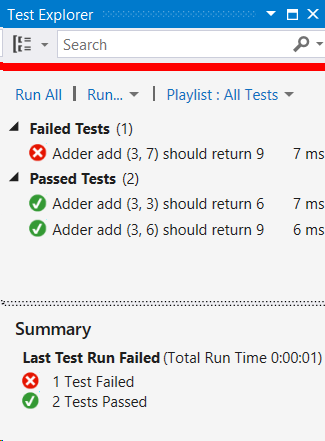
If I click on the failed test, the details are displayed:

It looks like the adapter works as expected!